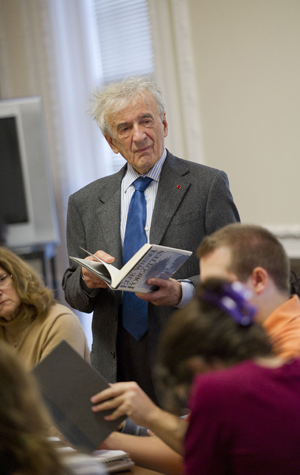First of Three Encounters with Elie Wiesel Tonight
Nobel Peace laureate explores fascination with Jewish tales

For nearly 40 years, BU students, faculty, and staff have been invited to an extraordinary event in the fall: a trio of lectures by 1986 Nobel Peace Prize laureate and Holocaust survivor Elie Wiesel. Every year, Wiesel (Hon.’74), BU’s Andrew W. Mellon Professor in the Humanities, brings to life his fascination with Jewish tales. While each lecture draws more than 1,000 attendees, no one enjoys them more than the renowned author himself.
“I live on that. I love learning,” says Wiesel, 83, who was recently appointed by President Barack Obama to the United States Holocaust Memorial Council. “My passion for learning is as old as my own life.”
Wiesel delivers his annual lectures with a storyteller’s flair, delving into the lives of great rabbinical and biblical figures. The series, titled Three Encounters with Elie Wiesel, takes place on consecutive Mondays, beginning tonight at 7 p.m. in the George Sherman Union’s Metcalf Hall.
The first lecture, In the Bible: Return to the Akeda—Why I Love Isaac, examines the story of the son of Abraham and Sarah as told in the Book of Genesis. Wiesel says Isaac plays the “second protagonist, the number two,” and is overshadowed by his father, who has been instructed by God to sacrifice his only son. “I simply want to rectify the injustice done to him,” Wiesel says, “so I’m making him the number one.” John Silber (Hon.’95), BU president emeritus, will introduce Wiesel at tonight’s lecture.
Rabbi Joseph Polak (Hon.’95), director of BU’s Florence and Chafetz Hillel House and a Holocaust survivor, says Wiesel often returns to this heart-wrenching father-and-son story. “He loves Isaac because of Isaac’s trust in his father,” Polak says. “His deep, deep abiding trust in his father is so unusual and rare, and that’s a trust that extends to the knife being lowered.” This idea of “though he slay me, still I trust him,” has resonated with the Jewish people since the Holocaust, Polak says.
Wiesel’s second lecture, on November 14, is titled In the Talmud: The Greatness of Rabbi Eliezer ben Hyrcanus and focuses on the first- and second-century sage, teacher, and master of the oral tradition. Deeana Klepper, a College of Arts & Sciences associate professor of history and religion and chair of the department of religion, will introduce Wiesel.
In the final lecture, on November 21, Wiesel discusses Today: Reflections on Good and Evil. The theme has figured prominently in his writings. “I have the feeling we are not thinking about it enough,” he says. “What makes people good or evil? What is the difference between the two?” Wiesel will be introduced by Polak.
Michael Zank, a College of Arts & Sciences professor of religion and acting director of the Elie Wiesel Center for Judaic Studies, says students, faculty, staff, and BU neighbors flock to the GSU to listen to Wiesel’s distinctive voice and to hear his tales. “He’s a witness to a different time, a different place, here in this country and in this time,” Zank says.
All lectures in the series Three Encounters with Elie Wiesel: The Fascination with Jewish Tales are held in the George Sherman Union’s Metcalf Hall, 775 Commonwealth Ave., and are free and open to the public. Doors open at 6 p.m. for the 7 p.m. lectures. Overflow seating is available in the Conference Auditorium. For more information, call 617-353-2238.
Comments & Discussion
Boston University moderates comments to facilitate an informed, substantive, civil conversation. Abusive, profane, self-promotional, misleading, incoherent or off-topic comments will be rejected. Moderators are staffed during regular business hours (EST) and can only accept comments written in English. Statistics or facts must include a citation or a link to the citation.